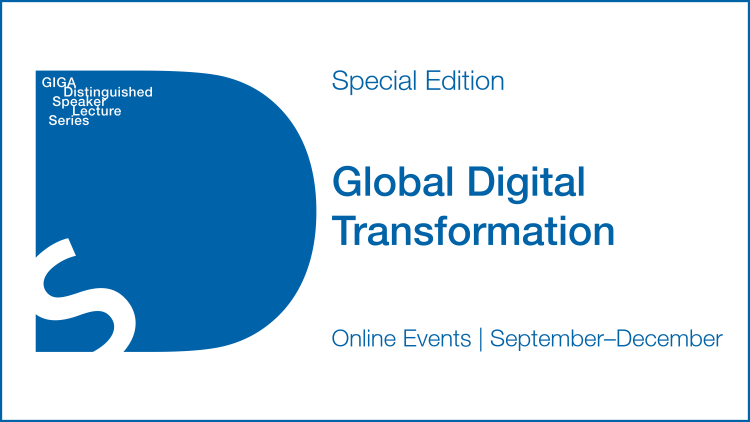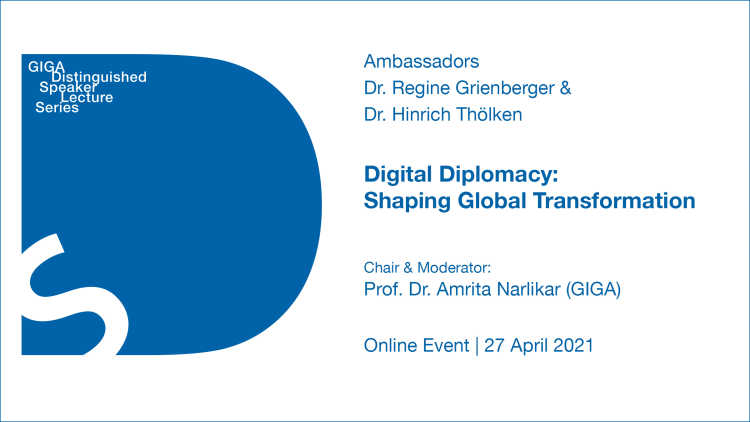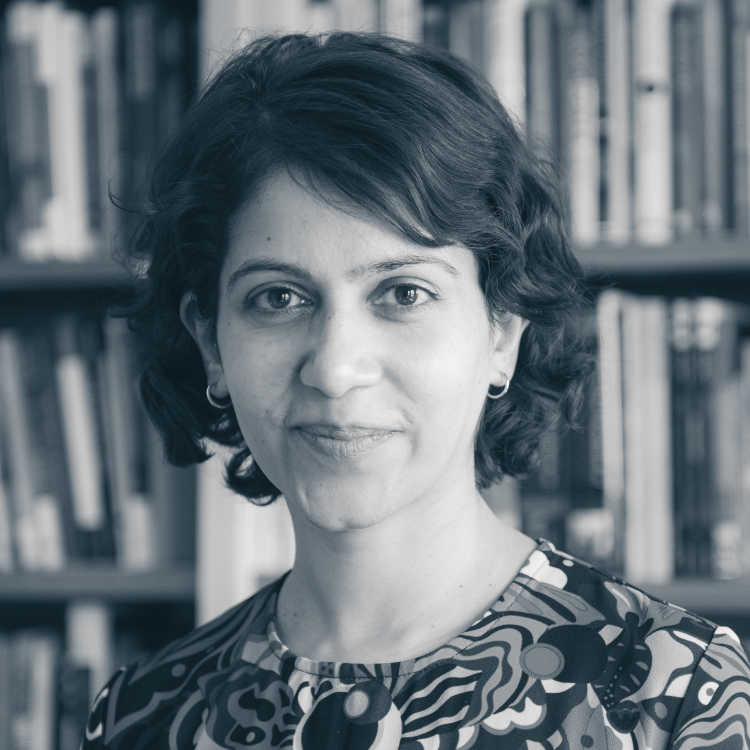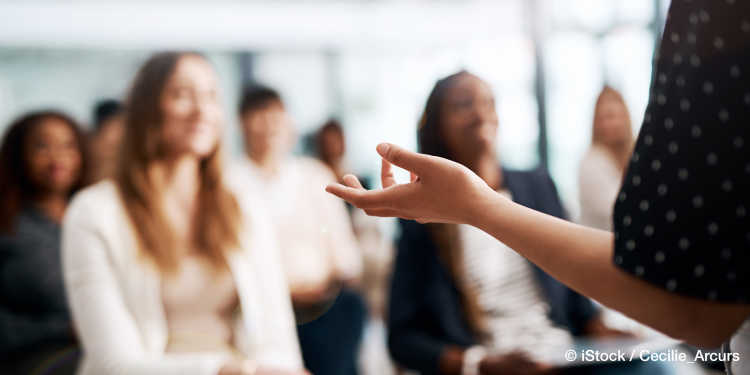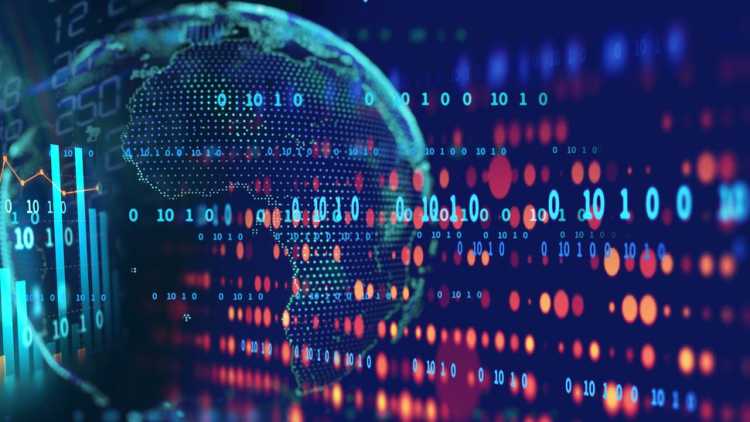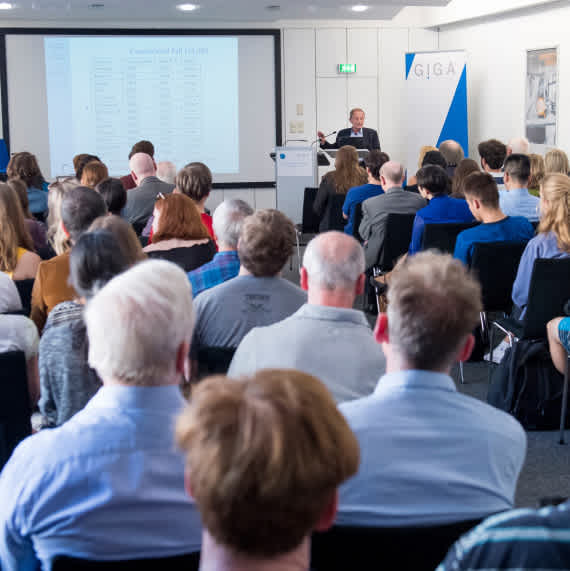- Startseite
- Veranstaltungen
- GIGA Distinguished Speaker Lecture Series
- Global Digital Transformation
GIGA Distinguished Speaker Lecture Series
Global Digital Transformation
Datum
12.09.2023 - 12.12.2023
The GIGA Distinguished Speaker Lecture Series brings leading minds in academia and policy from all over the world to the Institute to stimulate public exchange on key global developments.
In 2023, we tackle the global digital transformation from diverse angles and offer innovative perspectives on this extraordinary societal, economic, and political re-alignment.
This special series is part of our Digital Transformation Lab (DigiTraL) activities, funded by the Federal Foreign Office.
Organisers: Prof. Dr. Amrita Narlikar (GIGA) Julia Kramer (GIGA)
Kommende Veranstaltungen
Digital Diplomacy and African Countries: Opportunities, Challenges, and Future Prospects
Tuesday, 12 December 2023 | 1:00‒2:30 p.m. (CET)
In today’s highly advanced technological age, the combination of diplomacy and digital tools has become crucial for countries in their relations within the international community. African countries, with their different landscapes, histories, and development paths, are right in the middle of this change. This lecture explores the complex world of diplomacy in Africa, which is shaped by numerous geopolitical interests and a diverse range of cultures, and aims to carefully examine how digital diplomacy affects Africa. It will address key issues such as digital inclusion, cyber security, and cultural sensitivity. By examining specific case studies, this lecture adds to our understanding of the role of digital diplomacy on the global stage.
Speaker: Prof. Dr. Olubukola S. Adesina was appointed Lecturer II at University of Ibadan, Nigeria, in the Department of Political Science in 2006 and is currently a Professor in the department. She obtained a B.Sc. (Hons.) degree and MSc. Degree in Political Science from the University of Ibadan; and a Ph.D. in Political Science from the University of Natal (now University of Kwazulu-Natal), Pietermaritzburg, South Africa. Her area of specialization is International Relations, with a special focus on foreign policy, human security, civil society, and gender studies. She is a member of the International Society for Third-Sector Research (ISTR), the African Association of Political Science (AAPS), the Nigerian Political Science Association (NPSA), the African Studies Association (ASA), and the Global Development Network (GDN). Prof Adesina has published extensively in local and international journals. Chair & Moderation: Prof. Dr. Amrita Narlikar (GIGA)
Vergangene Veranstaltungen
The Concept of "the Human" in the Critique of Autonomous Weapons
Wednesday, 15 November 2023 | 1:00‒2:30 p.m. (CET)
Autonomous weapons systems (AWS) – so-called “killer robots” – are no longer the stuff of science fiction. In Libya, Syria, Nagorno-Karabakh, and most recently Ukraine, states have used weapons in combat that have an autonomous mode. And it is only a matter of time before AWS become ubiquitous on the battlefield.
As AWS have proliferated, so have calls to prohibit their use. Some objections are deontological, such as the contention that allowing machines to kill is inconsistent with human dignity. And still others are consequentialist, such as the claim that using AWS will lead to unnecessary civilian casualties because only human soldiers are capable of complying with international humanitarian law (IHL).
Despite their differences, all of these critiques emphasise the need for war to remain an exclusively human endeavour. The “human” they imagine, however, is an idealised one – a subject who is rational, self-determining, and capable of self-control. That conception of human subjectivity is contradicted by decades of research into how humans actually make decisions, particularly in dangerous and stressful situations such as armed conflict. As this lecture will show, once we accept humans as they are, not how critics imagine them to be, the case against AWS collapses: war fought with killer robots is likely to be far more “human” than war fought solely by human soldiers.
Speaker: Prof. Dr. Kevin Jon Heller is Professor of International Law and Security at the University of Copenhagen’s Centre for Military Studies. He currently serves as a Special Adviser on War Crimes to the International Criminal Court (ICC) Prosecutor and is an Academic Member of Doughty Street Chambers in London. His books include The Nuremberg Military Tribunals and the Origins of International Criminal Law (OUP, 2011) and four co-edited volumes: The Handbook of Comparative Criminal Law (Stanford, 2010), The Hidden Histories of War Crimes Trials (OUP, 2013), the Oxford Handbook of International Criminal Law (OUP, 2018), and Contingency in International Law: On the Possibility of Different Legal Histories (OUP, 2021). He has been a member of the international-law blog Opinio Jurisfor more than 17 years.
Chair & Moderation: Prof. Dr. Amrita Narlikar (GIGA)
Digital Diplomacy: The Changing Nature of Crisis Communication in an Age of Real-Time Governance
Wednesday, 11 October 2023 | 1:00‒2:30 p.m. (CEST) | 12:00 noon‒1:30 p.m. (BST)
From the power of the political hashtag, to the use of social media to announce Russia’s expulsion from the G8, the technological revolution has had a substantial impact on the practice of crisis communication. In the context of the rise in power of civil society, the globalisation of public opinion, and the unprecedented increase in new means of communication, the digital age has forced Ministries of Foreign Affairs (MFAs) to reassess, repackage, and ultimately transform their crisis communication strategies. The contribution of this lecture to the domains of diplomatic studies, international relations and communication studies is threefold: 1) expose and confront the changing nature of diplomatic crisis communication during the fourth digital age; 2) shed light on the use of two communicative capabilities (digital diplomatic signalling and online crisis narrative), exploring how, to what extent and with what comparison both capabilities are used by agents during political crisis; and 3) theorise and empirically demonstrate how both communicative processes serve (or do not serve) as instruments for virtual state enlargement during the conflict. These findings are of use to practitioners and scholars alike, and allow for the crafting of a set of best practices for MFAs and their agents during times of crisis.
Speaker: Dr. Jennifer Cassidy is a Departmental Lecturer in Diplomatic Studies at the University of Oxford. She gained her PhD from the University of Oxford. Exploring the evolving topic of Digital Diplomacy in an Age of Real-Time Governance is one of her primary research areas, alongside Technology, Diplomacy, Big Tech, Political Crisis, and the role of gender in the political and diplomatic sphere. She has served as a diplomatic attaché to Ireland’s Department of Foreign Affairs and Trade to the United Nations in New York, and the European Diplomatic Service to the Kingdom of Cambodia, working on the Khmer Rouge Tribunals, and development and human rights issues within the region.
Chair & Moderation: Prof. Dr. Amrita Narlikar (GIGA)
Promise, Paroxysm, Peril: Will Digital Societies Survive?
Tuesday, 12 September 2023 | 1:00‒2:30 p.m. (CEST) | 4.30‒6.00 p.m. (IST) A three-way contest is playing out between states, technology, and citizens – and impacting the very nature of selfhood, citizenship, and democracy. Even as tech shapes new platforms for civic mobilization, it is upending conventional democratic processes, creating new forms of surveillance capitalism, and supercharging the circulation of fake news and inflammatory content. Concomitantly, the tension between place- and likeness-based societies that underpin nation-states, and increasingly heterogeneous and polarized digital societies, is beginning to reach boiling point. Pincodes have been killed by coders, the age of cosmopolitanism is dying on the altar of digitalism, and cyberspace has become the theatre of a new tribalism. As these trends intensify, will digital societies survive, or are they destined for an all-too-brief future? Can a last stand be made to ensure order online? And in a digitally mediated world, can democratic debate be upheld, and the principles of inclusive rule-making preserved? Speaker: Dr. Samir Saran (ORF)
Chair & Moderation: Prof. Dr. Amrita Narlikar (GIGA)
Adresse
Online Event
Sprache
Englisch
Registrierung erforderlich
